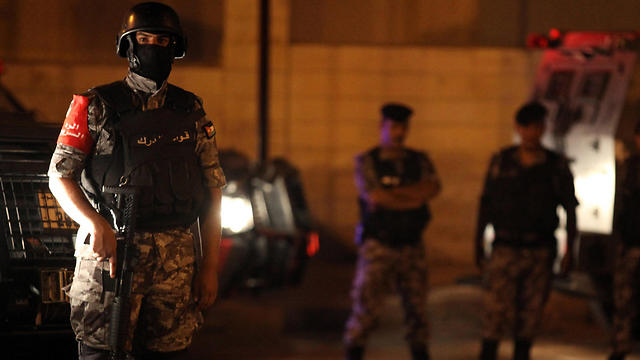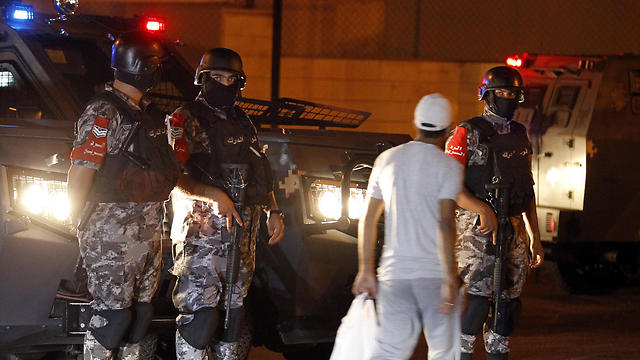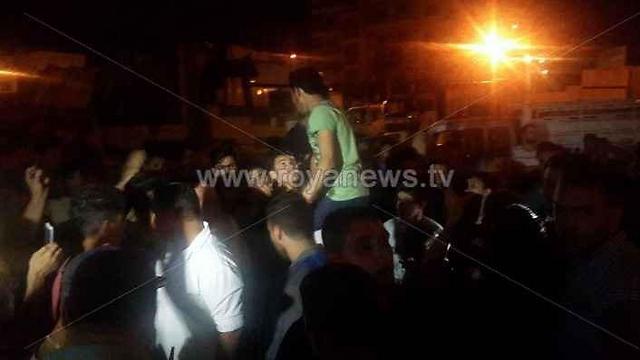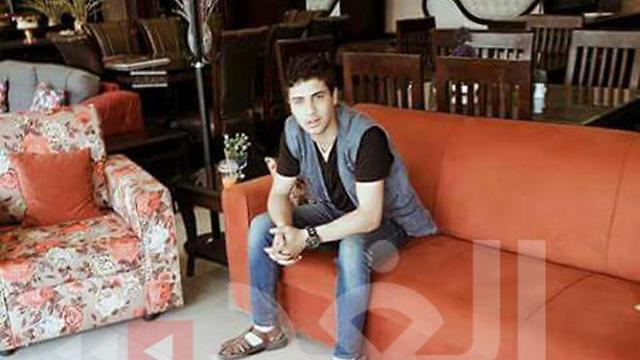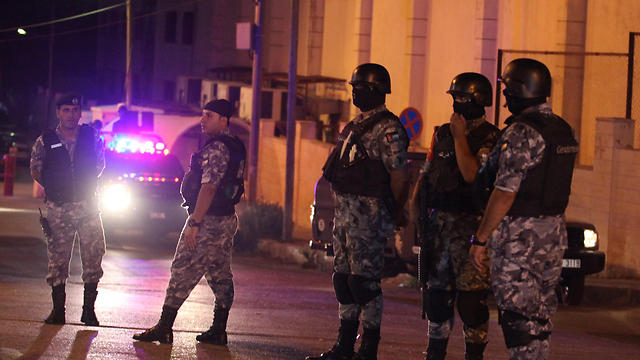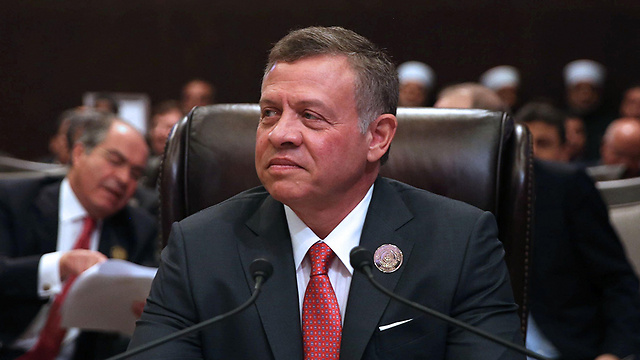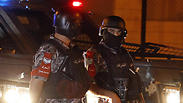

Guard kills Jordanian attacker, bystander at Israeli embassy in Amman
Guard at embassy compound in Amman attacked by 17-year-old worker wielding a screwdriver, shoots the assailant in self-defense while stray bullet accidentally kills Jordanian building owner; incident leads to standoff as Jordanian authorities seek to question guard; Israeli officials believe the attack to be nationalistically motivated as a result of Temple Mount tensions.
The owner of the building where the attack took place, a Jordanian doctor, was struck by a stray bullet and killed as well.
Jordanian security forces who arrived at the scene surrounded the embassy building in order to launch an investigation into the incident and sought to question the security guard.
Israel informed Jordan that according to the Vienna Convention, the security officer is immune from all criminal charges and civil suits in Jordan, and he will not be subject to arrest or interrogation. Currently, there is no official Jordanian request for the extradition of the Israeli security guard.
The guard, as well as all security personnel and embassy employees, are consequently now confined to the embassy compound.
According to ministry officials, the 17-year-old Mohammad Jawawdah entered the home of an embassy official to replace furniture, whereupon he happened to encounter the Israeli security guard and the Jordanian property owner.
The terrorist then came up behind the security guard and proceeded to stab him with a screwdriver, prompting the guard to produce a firearm and open fire at his attacker, killing him and the landlord.
According to Jordanian newspaper Al Ghad, the attacker died after being shot twice, while the Israeli security guard was stabbed in the chest.
Jawawdah had previously done maintenance work in the Israeli embassy and its residential compound.
Israeli Foreign Ministry officials said they believe the young man decided to attempt to murder an Israeli out of nationalistic motivations over the events surrounding the Temple Mount and had it not been for the guard's swift reaction, the incident could have ended differently.
Prime Minister Benjamin Netanyahu spoke with the Israeli ambassador in Jordan, Einat Schlein, on Sunday along with the security guard who was stabbed.
Both the Foreign Ministry and security officials are working through various channels with the Jordanian government in an attempt to contain the situation.
The Israeli censor barred overnight media reports on the incident in what it called a move to protect the diplomats from reprisals, and its statement on Monday did not detail the aftermath.
The Israeli embassy in the affluent Rabae district of Amman is protected by Jordanian gendarmes. It has long been a flashpoint of anti-Israel protests at times of turmoil in the Palestinian territories.
A US official said that President Donald Trump's Middle East envoy, Jason Greenblatt, was due in Israel on Monday and was likely to attempt some mediation in the crisis.
'My son is a martyr'
Dozens of family members of the attacker gathered in Asharq Al-Awsat square in Amman to protest his death. They demanded that the Jordanian government release all details of the investigation and punish the shooter. Jordanian security forces dispersed protestors using tear gas.
In an interview with Jordanian television station Ro'ya TV, the stabber's father insisted that his son did not know the nationality of the man who killed him and that he was a regular customer who bought furniture from them.
"My son was not a trouble-maker or a terrorist and he did not belong to any political parties," said Zakaria Jawawdah, whose family has Palestinian roots. "I want to know how the investigation is going and know what happened and what led to the killing of my son."
Zakaria said an Israeli embassy employee bought a bedroom furniture set and the 17-year-old came to the apartment to set up the furniture. "Our last conversation was at 2pm. He told me he was going to get the equipment he needed for installation," he said.
He added that he was told about the shooting after calling the building's security guard, who told him his son was taken the hospital along with another local and an Israeli guard.
"I consider my son to be a martyr for Allah," said the father.
According to a senior Israeli official, "We have no doubt that the young Jordanian was a terrorist who came to murder an Israeli." The official also pointed a finger at Jordan, who is demanding to question the guard, saying, "They also know full well that he is a terrorist, but they're taking advantage of the Temple Mount crisis."
"This is a serious incident, but we have to put it in proportion because both countries prefer to prevent this matter from disrupting relations at such a sensitive time," said former Israeli ambassador to Jordan Oded Eran.
"Jordan has other problems—a million and a half refugees, ISIS in the kingdom, and it's too sensitive and explosive. This incident cannot darken relations between Israel and Jordan," said Eran.
According to Eran, the incident can be resolved in a number of manners.
"For example, a copy of the Israeli investigative report and interview with the Israeli security guard can be given to the Jordanian government. Also, the Jordanians could interview the guard within the Israeli embassy and in the presence of Israeli representatives. There are creative ways to get out of this undesirable predicament."
Eran also emphasized that "Jordan has no interest in adding fuel to a fire that it cannot control. As such, we need to give them a way to get out of this in a creative way so that the king does not lose face.
"He (the king) should be given the opportunity to appear to be in control of his kingdom, while at the same time preserving the rights of that security guard and the political rights that Israel has."
 |
In a demonstration in Amman on Friday, thousands of people protested against Israel while brandishing model rockets with the inscription "Al Aqsa—a red line." Other protestors shouted, "How beautiful it is to kill soldiers in Jerusalem."
Reuters contributed to this report.














